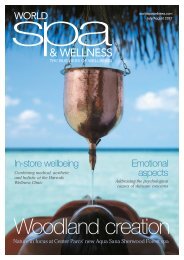Better Nutrition August 2017
You also want an ePaper? Increase the reach of your titles
YUMPU automatically turns print PDFs into web optimized ePapers that Google loves.
Q: How can I make sure that I’m buying a<br />
quality supplement?<br />
Dr. Low Dog: Stick with reputable brands manufactured<br />
in the U.S. Most of the really disturbing news<br />
about “supplements” is not about vitamins, minerals,<br />
or common nutritional supplements, which generally<br />
contain what they claim on their labels. Steer clear of<br />
herbal products coming out of China and India that have<br />
been found on numerous occasions to be adulterated<br />
with undeclared prescription drugs, as well as high<br />
levels of lead, mercury, and/or arsenic.<br />
Also, look for third-party seals such as The United<br />
States Pharmacopeia, a scientific nonprofit organization<br />
that sets standards for the identity, strength, quality, and<br />
purity of dietary supplements manufactured, distributed,<br />
and consumed worldwide; NSF International, an independent<br />
organization of scientists and public health<br />
experts that sets standards for supplements and tests<br />
and certifies them; and Consumer Labs, a private company<br />
that tests numerous branded products and allows<br />
companies that pass its quality tests to use its seal.<br />
Q: How do I know if a manufacturer’s claims<br />
about a supplement are accurate?<br />
Dr. Low Dog: The Food and Drug Administration<br />
(FDA) has strict rules about what companies can<br />
say about supplements. Manufacturers can claim that a<br />
supplement supports general well-being or the normal<br />
structure or function of the human body. For instance,<br />
such statements as “Calcium builds strong bones” or<br />
“Antioxidants maintain cell integrity” are permitted.<br />
However, labels (and advertisements) cannot claim that<br />
a supplement treats or cures diseases. So, while there<br />
are randomized controlled trials that demonstrate that<br />
the herb St. John’s wort is effective for the treatment of<br />
depression, for example, a manufacturer cannot say this<br />
on the label. Instead, the label would have to say something<br />
like, “St. John’s wort supports a healthy mood.”<br />
Q: It seems like recommended supplement<br />
dosages range everywhere from minimum daily<br />
values to mega-doses. How do I know what’s<br />
right for me?<br />
Dr. Low Dog: Figuring out how much of a certain supplement<br />
you should take is important, regardless of the manufacturer’s<br />
recommendations. When it comes to vitamins<br />
and minerals, we have a pretty good idea about how much<br />
is needed to prevent disease. Most of us, however, would<br />
AUGUST <strong>2017</strong> • 47






